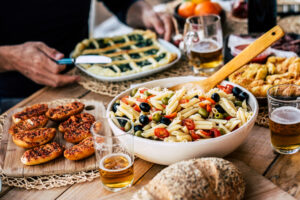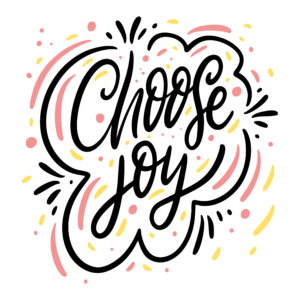Objectives
- Our view of the world and our place in it is programmed in from the moment we are born.
- It becomes reinforced with age. Our relationship with food is a core example.
- Like many aspects of our life, we mentally punish ourselves if we don’t stick to our ideal of a healthy diet.
- Use your relationship to food as a way of looking at how you relate to life. Choose joy!
Our view of the world and of ourselves is programmed by our entire life experience from the time of birth until this present moment. Most of it originates from the messaging that society, parents, relatives, friends, and colleagues feed to us about who we should or not be or doing. We end up being the product of everyone else’s perceptions. “Should thinking” is a cognitive distortion. We are our programming and not particularly connected to the core of who we are.
Your “life lens”
Neuroscience research on consciousness has also shown that thoughts and concepts become as concretely embedded in our brains as any object such as a car or a house.1 The summation of all this input becomes our unique “life lens” that is continually being reinforced. If your new data agrees with your views, they are reinforced. If it contradicts your life concepts, you’ll reject it, and it has been shown to strengthen the position even more. The marketing term for this phenomenon is, “reactance.”2 You may have noticed that facts rarely change anyone’s mind. The only option is if you choose to be become aware of your life lens and change it. Unfortunately, change creates anxiety, and we resist it.

The mental construct of who we are and our place in the world is projected onto others in the form of judgements, with a good share of them being negative. We call this “self-esteem.”
Rigidity around food (and life)
We all must eat and each of us has our personal relationship with food. We develop belief systems based on our best summation of a lot of information. Then with time and repetition it often becomes an entrenched belief system. Here is where the trouble lies. If you have a certain fixed belief system in any domain of life, your brain spends a lot of energy correlating ongoing input with it. Our need to eat arises from our powerful unconscious brain and the drive is unending and powerful. Your rational brain is weak (a million times so) in comparison, and you’ll quickly experience “cognitive fatigue”3 trying to stick with a rigid diet. Why?
So, you have an “ideal” of what you should be eating every time you are exposed to food. If you act in accordance with your internal standards, you have control, and you are happy. What about when you “fail.” Consistent with many other aspects of our lives, we become self-critical. “I should be eating this way”, or “I shouldn’t have eaten this. You now feel badly. The more rigid and higher your “standards”, the more of your energy you’ll be expending, and you’ll fatigue. The brain consumes 20-25% of all of your body’s fuel.4 This ongoing sense of “failing” and mental self-criticism is a significant factor why many of us experience a “yo-yo” diet and it is challenging to maintain weight loss.
Then look at the other areas of your life that you are self-critical and remorseful. Your job, parenting, missed opportunities, skill level, accomplishments, and this list is infinite. We are generally programmed by “not being good enough.”
Food as an opportunity to choose joy
Your relationship to food is a wonderful opportunity to flip this paradigm. There are two parts. The first is to be kind to yourself regardless of your “performance.” Each of us can only do the best we can based on our skill sets and levels of stress. So, anytime you “fail” in meeting your standards of eating, always give yourself a break. Then the key to healing is awareness. It doesn’t matter whether you are being judgmental or trying not to be. Either energy reinforces judgment. Awareness allows you to create some distance between you and this reaction and eventually it will lower in intensity and maybe even almost disappear (it can’t ever completely resolve).
Then as you watch your relationship to food, you can choose to enjoy your meal regardless of what it consists of. It is somewhat perverse that the unhealthiest food is the most satisfying. What will happen, as you train your brain to stop reacting, is that you will have more energy to live your life in a more proactive enjoyable manner and actually eat better.

Eating and cognitive distortions
Consider why the alternative of negative reinforcement around eating beliefs detracts from your capacity to enjoy life. Many of the resultant thoughts around not eating right are cognitive distortions as described in David Burn’s book, Feeling Good.5 Since we have to deal with food daily, there is no end to them, and it is one of the ways your body’s physiology remains in a threat state. What are some of the distortions?
- “Should” thinking
- Labeling – “I am failure because I had a donut.
- Catastrophizing – viewing an event as having a major effect when in reality it has little effect on your life. For example, you may have chosen to have a vegan diet, but having an occasional hamburger is not going to affect your overall health.
- All or nothing thinking – seeing things in terms of absolutes.
These are distortions that exist in all aspects of our lives. The opportunity lies using food to highlight them and observe how they play out in other arenas. It is much different observing our judgmental nature than fighting it or trying to fix it. There is also no endpoint or logical conclusion to endless self-criticism. When do you get to truly live the life you want?
So, what is the alternative? Choose joy. Regardless of what you are eating or how much, choose joy. That also means making the choice to remain aware and watch the negative thought patterns march through. Eventually, as your focus continues to remain on nurturing joy, it will also work in nurturing you. Paradoxically, you may simply notice how much better you feel when you eat more healthfully, and it becomes easier to make better choices.
“Love yourself”
Here is one small story in how this can work. I have a close friend who has wanted to lose some weight for a while. He engaged in the usual dieting approaches such as counting calories, trying to eat more healthfully, avoiding junk food, and exercising more frequently. These are great things to do, but when he failed, he would mentally beat himself up. The outcome was the usual yo-yo weight loss with the end result being frustrated in addition to not losing weight. He made the decision to “love himself” regardless of his dietary patterns. He lost 15 pounds in 6 months and maintained it. This is just one story but consider how our general approach to food can detract from our capacity to enjoy life.
I am not saying that a healthy diet isn’t desirable. In fact, a healthy anti-inflammatory diet can dramatically improve your health and sense of well-being. It is a significant factor in decreasing mental and physical pain. What I am saying is that focusing on nurturing yourself as opposed to mentally punishing yourself when you fail to meet your dietary standards (or any other ones) allows you have higher chance of eating better. Additionally feeling content with who you today are is anti-inflammatory.

Recap
Rigidity around food is a powerful metaphor for rigidity in other aspects of your life. Food is an opportunity to learn strategies to lower anxiety in order to not need to me in so much control. The stress generated from “failing to meet your internal standards” not only detracts from your capacity to enjoy life but is inflammatory and damaging to your health.
The essence of healing is minimizing your time in inflammatory threat physiology and increasing your exposure to safety. An anti-inflammatory diet contributes to healing, but ongoing self-criticism is a form of anger, which is highly inflammatory. Why not love yourself first, regardless of your behaviors? Many of them are not ideal, but how does it help you to mentally beat yourself up? You don’t have to like many of them. However, we all are doing the best we can with what we have been given.
Choosing to enjoy the experience of eating creates an energy that carries into other arenas of your life. You get to practice daily (sometimes all day). Enjoying your life also changes your body’s chemistry to safety, you’ll react less, think more clearly, and make better choices about food. Then there is the added benefit of your diet being less inflammatory and you’ll feel even better.
Questions and considerations
- You might feel that this article is not relevant to you. You may not care about eating a healthy diet. Consider that maybe you don’t care about your health. You are used to feeling badly, don’t see any hope, and have given up. This is “The Abyss.” Being aware that you are in this spot is the first step in healing. Don’t give up, and please start your healing journey.
- Have you considered that being more focused on your beliefs about diet might detract from enjoying your meal? Having rigid belief systems about life is also tedious and eventually wears you down. There is not much room to nurture joy.
- Food is a basic defined need and your relationship to it becomes deeply embedded in your unconscious mind with repetition. It is easy to see and becoming aware of its impact will allow you to address other aspects of your life.
- Remember, a healthy diet is better, but self-criticism is a bigger issue. Why not address both?
References
- Feldman-Barrett, Lisa. How Emotions are Made. Mariner Books, Harper Collins, New York, NY, 2017.
- Berger, Jonah. The Catalyst: How to Change Anyone’s Mind. Simon and Schuster, New York, NY, 2020.
- Kahneman, Daniel. Thinking Fast and Slow. Farrar, Strauss and Giroux, New York, NY, 2011.
- Xu J, and S Xu. Possible reason for the high metabolic rate in neurons of a brain. Austin Jrn of Women’s Health (2018); 5:1031.
- Burns, David. Feeling Good. Harper Collins, New York, NY, 1980, 1999.
